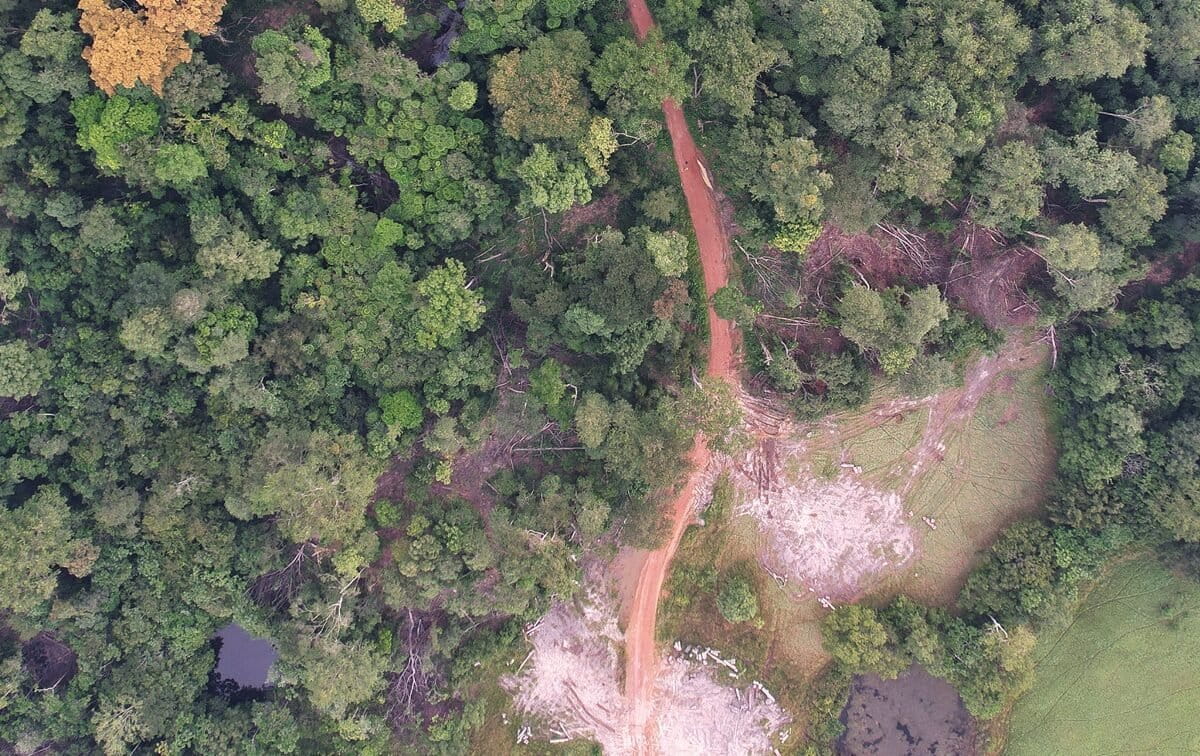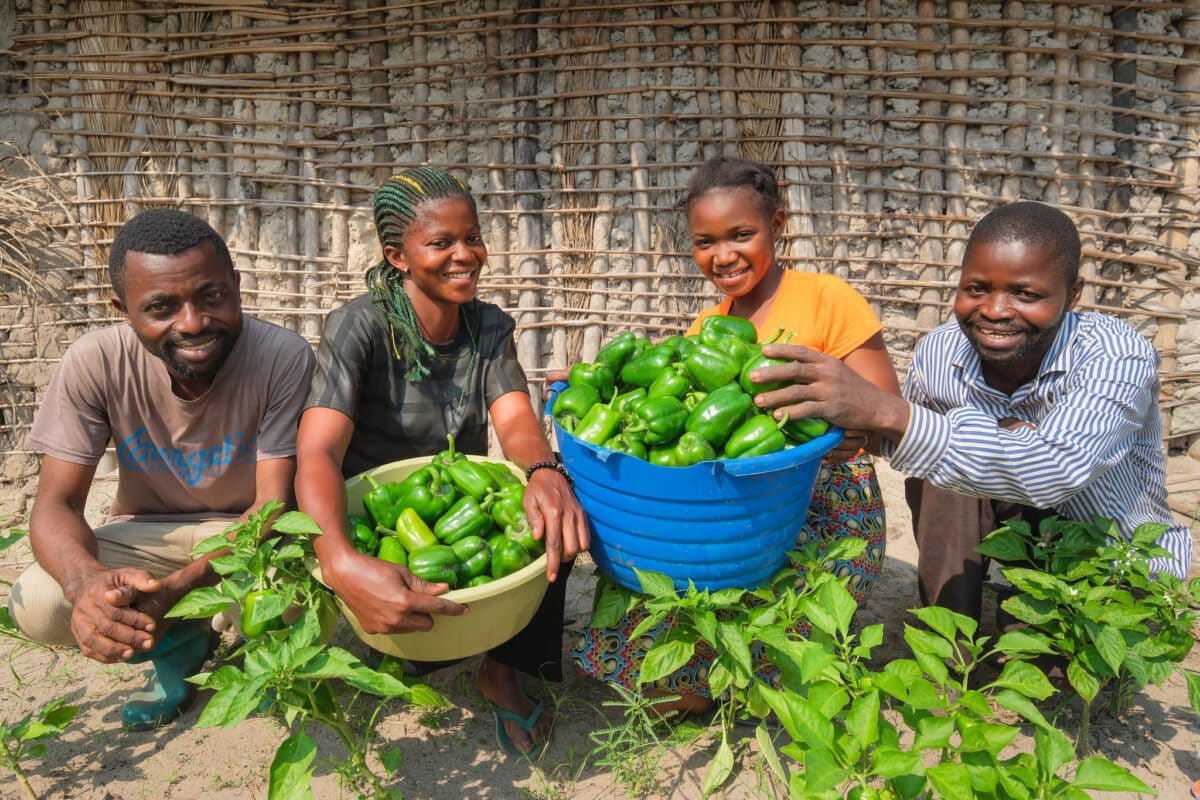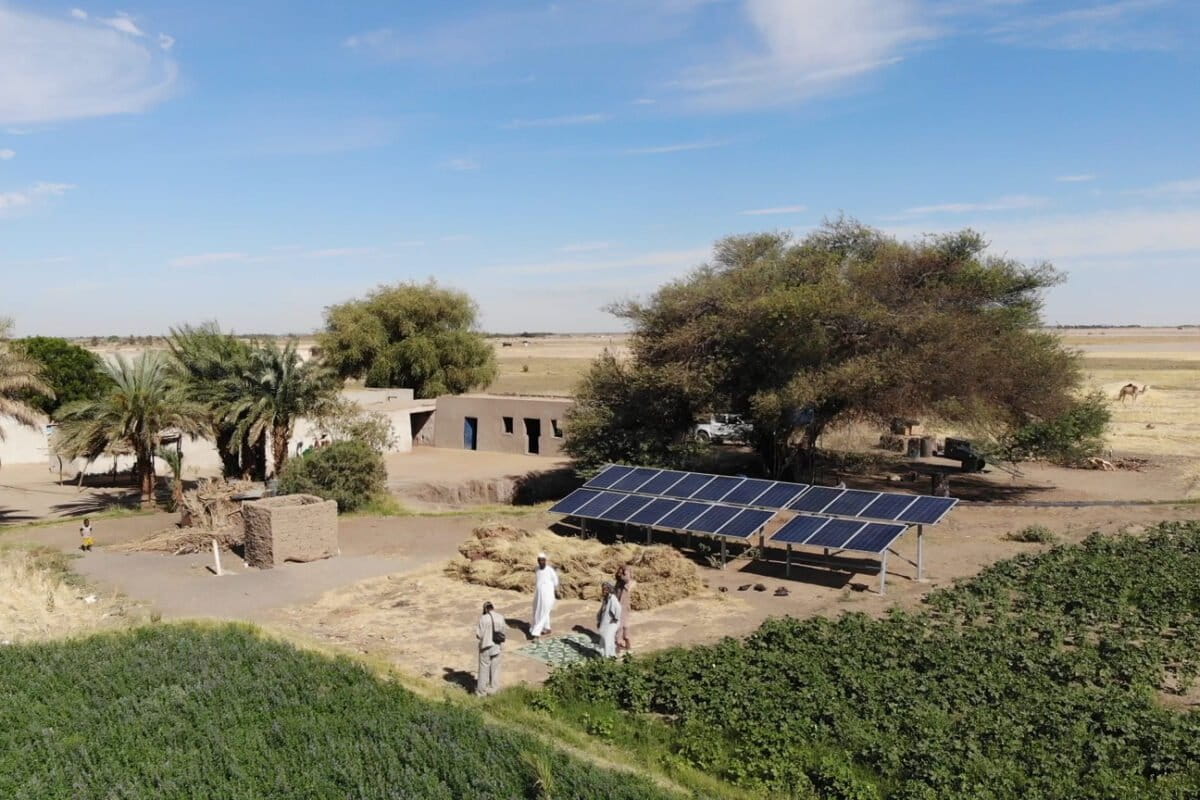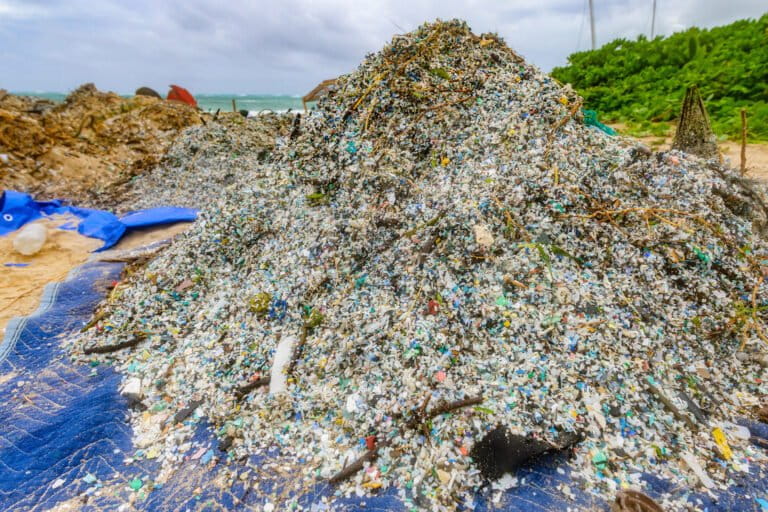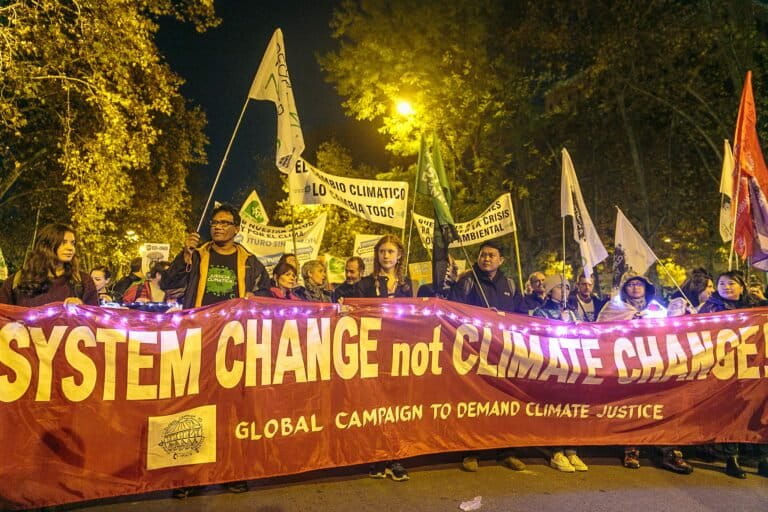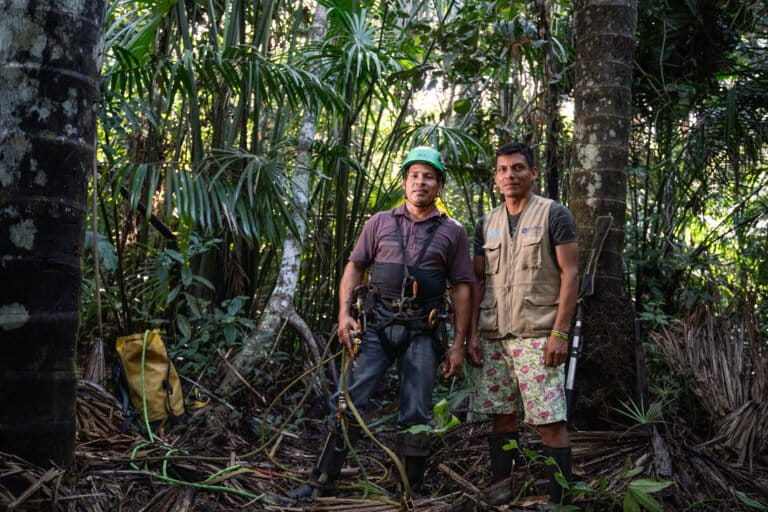A global framework on climate change must immediately halt deforestation and industrial logging of the world’s old-growth forests, while protecting the rights of forest communities and indigenous groups, said a broad coalition of activist groups in a consensus statement issued today at U.N. climate talks in Bonn Germany. The statement said the successor treaty to the Kyoto Protocol should not include mechanisms that allow industrialized countries to “offset” their emissions by purchasing carbon credits from reducing deforestation in developing countries, a position that puts the coalition at odds with larger environmental groups who say a market-based approach with tradable credits is the only way to generate enough money fund forest protection on a global scale.
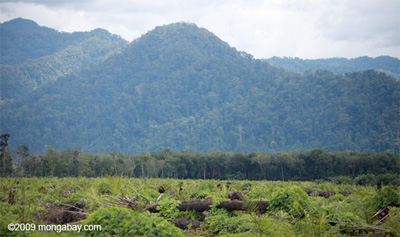
Deforestation for an oil palm palm plantation (used for palm oil production) in Sumatra. |
“Due to a broad range of ethical, social and methodological risks, forest-based carbon offsets will undermine an effective, equitable and socially just climate regime,” said the statement. “Climate change mitigation and sustainable forest management must be based on different mindsets with full respect for Nature, and not on carbon offset mechanisms. Public funding mechanisms that ensure environmental integrity and equitable distribution of funds must be made established.”
The coalition statement calls upon industrialized countries to cut their greenhouse gas emissions 45 percent by 2020 and 95 percent by 2050 as an “absolute minimum” in addition to providing “sufficient financial and technological support to enable developing countries to halt the destruction of forests and other ecosystems.” The targets are well above those laid out by industrialized countries, which generally fall in the 15-30 percent range by 2020, and 80 percent by 2050.
Advocates of a market-based approach that includes tradable credits say public funding mechanisms will be subject to political risk (funding for forest conservation would compete with other priorities under a public finance arragnement) and fail to provide sufficient funds to effectively address the drivers of deforestation, including logging, industrial agriculture, cattle ranching, and subsistence farming. In other words, the compensation scheme must make forests more valuable as living entities than the goods that can be produced from chopping them down. Otherwise deforesters — whether they be poor farmers, ranchers, plantation developers, or loggers — will continue to destroy them.
Negotiators will meet in Copenhagen this December to hammer out a post-2012 climate agreement. The agreement is widely expected to include provisions for forest conservation since research shows it will be impossible to meet emissions targets without reducing deforestation and forest degradation, which accounts for nearly one-fifth of greenhouse gas emissions, a share larger than all the world’s cars, trucks, planes, trains, and ships combined.
-
Coalition Statement
The undersigned broad coalition of NGOs, Indigenous Peoples’ Organizations and women’s groups call upon the Parties to the FCCC to take into account the critical role of forest conservation in climate change mitigation. The protection of forest biodiversity is vital for life on earth. Native forest ecosystems provide us with clean air, clean water, a safe climate, food, fodder and shelter and they are an important part of our global and cultural identity. Forests provide aesthetic and intrinsic values. Indigenous Peoples and traditional local communities of the forests are the guardians and original conservationists of the forest. They maintain a food sustenance and socio-cultural relationship to the forests based on their cosmovision.
For that reason, we call upon Parties to:
– Immediately put in place rights-based and equitable policies and institutions to halt deforestation and forest degradation and the destruction of other natural ecosystems like peatlands and grasslands in all continents
– Identify and address the direct and underlying causes of deforestation and forest degradation;
– Ensure that these policies and measures uphold international human rights and environmental standards and are fully consistent with the UN Declaration on the Rights of Indigenous Peoples. This includes the effective adoption and implementation by all Parties and all UN agencies and multilateral banks of the Right to Free Prior and Informed Consent of Indigenous Peoples and local forest dependent communities;
– Ensure that these policies take into account the specific role, rights and interests of women and are fully consistent with Convention on the Elimination of all forms of Discrimination Against Women;
– Ensure that these policies are fully consistent with the Convention on Biodiversity and its Expanded Program of Work on Forest Biodiversity and contribute meaningfully to conserving and enhancing biodiversity and related cultural diversity, traditional knowledge and spirituality;
– Explicitly exclude the establishment and management of monoculture tree plantations, including genetically modified tree plantations, and the practice of industrial logging from these policies. This also implies adopting a forest definition that clearly distinguishes forests from monoculture tree plantations;
– Ensure any policies intended to reduce deforestation and forest degradation include measures to reduce consumption of forest products, especially in the Industrialized North;
– Ensure these policies secure the fair and equitable sharing of the benefits of forests and other ecosystems, both between countries and within countries, taking into account the critical role of Indigenous Peoples, local communities and women in conserving and restoring forests and other ecosystems. This also implies recognizing the customary and collective land tenure and forest rights of Indigenous Peoples and ensuring the full and effective participation of Indigenous Peoples, local communities and women in all decision-making processes related to forests;
We call upon developed countries to recognize the historical debt to developing countries caused by their excessive greenhouse gas emissions. This implies immediate and drastic cuts in their domestic greenhouse gas emissions (45% by 2020/ 95% by 2050 as an absolute minimum) AS WELL AS providing sufficient financial and technological support to enable developing countries to halt the destruction of forests and other ecosystems. It is too late for either/or policies. Any form of carbon offsetting, including CDM afforestation/reforestation and REDD offset projects will only increase the ecological footprint and carbon debt of developed countries and must thus be avoided. (Due to a broad range of ethical, social and methodological risks, forest-based carbon offsets will undermine an effective, equitable and socially just climate regime.) Climate change mitigation and sustainable forest management must be based on different mindsets with full respect for Nature, and not on carbon offset mechanisms. Public funding mechanisms that ensure environmental integrity and equitable distribution of funds must be made established.
The coalition of youth, environmental groups, NGOs, Indigenous peoples’ Organizations, women’s groups who have signed this survival plea include:
International Youth caucus in Bonn
Ecosystems Climate Alliance
Global Forest Coalition
The Wilderness Society
World Rainforest Movement
Global Witness
Greenpeace
Rainforest Action Network
Wetlands International
Rainforest Foundation Norway
Rainforest Foundation UK
FERN
Friends of the Earth
Sobrevivencia/FoE-Paraguay
Indigenous Environmental Network
Global Justice Ecology Project
CORE India
Life gender, Environment and Diversity Germany
Sustainable Population Australia
Tanzania Forest Conservation Group
the Tanzania Community Forest Conservation Network MJUMITA
Stop GE Tree Campaign
RAVA Institute Indonesia
SWBC Nepal
Timberwatch Coalition South Africa
Pacific Indigenous Peoples Environment Coalition
Friends of the Siberian Forests Russia
Focus on the Global South
Women´s Environment Network Australia
Biofuelwatch
Women Environmental Programme Nigeria
Just Environment
COECO-CEIBA-Friends of the Earth Costa Rica
WALHI-Friends of the Earth-Indonesia
Down to Earth
Carbon Trade Watch
Women’s Environment and Development Organization
Watch Indonesia
Asociacion ANDES Peru
Ecologistas en Accion Spain
Sustainable Energy and Economy Network
North East Peoples Alliance on Trade, Finance and Development India
WISE Inc. Philippines
GenderCC
FASE Solidarity and Education Brazil
Global Exchange
Kingdom Narintarakul Thai Working group for Climate Justice
Union pour l’Emancipation de la Femme Autochtone
Forest degradation is huge source of CO2 emissions
(06/05/2009) Selective logging, understory fires, fuelwood harvesting, and other forms of forest degradation are a substantial source of greenhouse has emissions, reports a policy brief issued by The Nature Conservancy (TNC) at U.N. climate talks in Bonn, Germany.

(06/04/2009) A new paper by Oscar Venter, a PhD student at the University of Queensland, and colleagues finds that forest conservation via REDD — a proposed mechanism for compensating developing countries for Reducing Emissions from Deforestation and Degradation — could be economically competitive with oil palm production, a dominant driver of deforestation in Indonesia. The study, based on overlaying maps of proposed oil palm development with maps showing carbon-density and wildlife distribution in Kalimantan (Indonesian Borneo), estimates that REDD is financially competitive, and potentially able to fund forest conservation, with oil palm at carbon prices of $10-$33 per ton of carbon dioxide equivalent (tCO2e). In areas with low agricultural suitability and high forest carbon, notably peatlands, Venter and colleagues find that a carbon price of $2 per tCO2e would be sufficient to beat out returns from oil palm.
Brazil’s plan to save the Amazon rainforest

(06/02/2009) Accounting for roughly half of tropical deforestation between 2000 and 2005, Brazil is the most important supply-side player when it comes to developing a climate framework that includes reducing emissions from deforestation and forest degradation (REDD). But Brazil’s position on REDD contrasts with proposals put forth by other tropical forest countries, including the Coalition for Rainforest Nations, a negotiating block of 15 countries. Instead of advocating a market-based approach to REDD, where credits generated from forest conservation would be traded between countries, Brazil is calling for a giant fund financed with donations from industrialized nations. Contributors would not be eligible for carbon credits that could be used to meet emission reduction obligations under a binding climate treaty.
Excluding forest carbon from climate policy will spur massive deforestation

(05/28/2009) Failure to develop policies that account for emissions from land use change will lead to widespread deforestation and higher costs for addressing climate change, warn researchers writing in the journal Science. Using a computer model that incorporates economics, energy, agriculture, land-use changes, emissions and concentrations of greenhouse gases, a team of researchers from the Department of Energy’s Pacific Northwest National Laboratory (PNNL) and the University of Maryland found that efforts to limit atmospheric carbon dioxide levels while ignoring emissions from terrestrial sources would lead to nearly a complete loss of unmanaged forests by 2100, resulting largely from increased expansion of bioenergy crops. Meanwhile placing a value (“tax”) on terrestrial carbon emissions equivalent to that on industrial and fossil fuel emissions would lead to an increase in forest cover.



